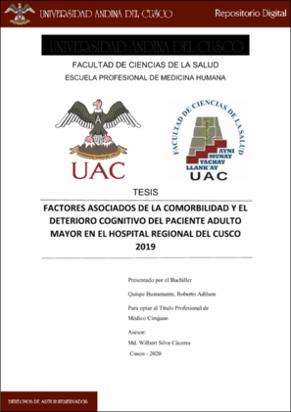| dc.contributor.advisor | Silva Cáceres, Wilbert | |
| dc.contributor.author | Quispe Bustamante, Roberto Adilson | |
| dc.date.accessioned | 2020-09-14T17:37:47Z | |
| dc.date.available | 2020-09-14T17:37:47Z | |
| dc.date.issued | 2020-04-27 | |
| dc.identifier.uri | https://hdl.handle.net/20.500.12557/3377 | |
| dc.description.abstract | Introducción: El deterioro cognitivo describe la alteración en uno o más dominios de la
cognición superior/es a lo esperado en una persona de la misma edad.
Objetivo: Determinar la relación de los factores asociados de comorbilidad que
determinan el deterioro cognitivo del adulto mayor que asisten a consulta médica en el
Hospital Regional del Cusco en el periodo de julio septiembre del 2019
Material y métodos: Estudio no experimental, de tipo analítico descriptivo, corte
transversal, prospectivo y correlacional, realizado en el Hospital Regional del Cusco
durante el periodo julio-septiembre del 2019, en 230 pacientes que cumplieron los
criterios de selección. Se realizó una entrevista directa con el paciente para el llenado de
datos con la aplicación del test de Montreal y Mini Cog, para la evaluación del
deterioro cognitivo, creándose una base de datos y utilizándose para su procesamiento la
versión SPSS 24, con estadística descriptiva e inferencial básica.
Resultados: El mayor grupo etario que los factores asociados en las edades
comprendidas 76-80 años (23.0% - 7%) reflejan mayor deterioro cognitivo, no hubo
diferencias importantes en cuanto al género. El DC fue mayor en los adultos mayores
viudos 13.9% (p<0,05), el tiempo de la comorbilidad con 10 años presento DC
(p<0,05) los estilos de vida como el no consumo de frutas y verduras contribuye al
deterioro desde un 21.7% hasta 82%; actividad física de hasta 30 min disminuye el
riesgo de hasta un 7.8%; el consumo de alcohol muestra una asociación significativa
con el deterioro cognitivo (p<0.04). Al comparar el test de Montreal y Mini Cog, se
observa diferencias significativas entre ambas pruebas, detectándose más casos con la
primer: Montreal evidencio un 91.7%% de casos con deterioro, frente a 27% del Mini
Cog. de la misma forma contribuye el nivel socio económico (p<0.01) y la función
familiar (p<0.008) las comorbilidades que se asocian en frecuencia osteoartritis (25.7%7.8%)
diabetes
mellitus
(25.3%-10.9%),
hipertensión
arterial
(21.3%
-
4.8%),
obesidad
(19.6%
-
3.5%)
con
el
test
de
Montreal
y
Mini
Cog
respectivamente
Conclusiones: las factores asociados del deterioro cognitivo como la edad a partir de 75
años, el ser viudo, los estilos de vida son factores que conllevan al deterioro cognitivo;
de la misma forma contribuye el nivel socio económico y la función familiar. | es_PE |
| dc.description.abstract | Introduction: Cognitive impairment describes the alteration in one or more domains of
higher cognition / s than expected in a person of the same age.
Objective: To determine the relationship of the associated factors of comorbidity that
determine the cognitive deterioration of the elderly who attend a medical consultation at
the Regional Hospital of Cusco in the period of July, September, 2019
Material and methods: Non-experimental, descriptive analytical, cross-sectional,
prospective and correlational study, carried out at the Cusco Regional Hospital during
the period July-September 2017, in 230 patients who met the selection criteria. A direct
interview was conducted with the patient to fill in the data with the Montreal test
application and Mini Cog for the evaluation of cognitive impairment, creating a
database, the SPSS 24 version was used for data processing, with descriptive statistics
and basic inferential.
Results: The greater age group than the associated factors in the ages between 76-80
years (23.0% - 7%) reflect greater cognitive deterioration, there were no important
differences regarding gender. The DC was greater in the widowed older adults 13.9% (p
<0.05), the time of comorbidity with 10 years DC presented (p <0.05) the lifestyles as
the non-consumption of fruits and vegetables contributes to the deterioration from
21.7% to 82%; physical activity of up to 30 min reduces the risk of up to 7.8%; alcohol
consumption shows a significant association with cognitive decline (p <0.04). When
comparing the Montreal and Mini Cog tests, significant differences were observed
between the two tests, detecting more cases with the first: Montreal showed 91.7% of
cases with deterioration, compared to 27% of the Mini Cog. the socio-economic level (p
<0.01) and the family function (p <0.008) contribute in the same way. comorbidities
that are associated in frequency osteoarthritis (25.7% -7.8%) diabetes mellitus (25.3% 10.9%),
hypertension (21.3% - 4.8%), obesity (19.6% - 3.5%) with the Montreal and
Mini tests Cog respectively
Conclusions: the associated factors of cognitive decline such as age from 75 years,
being a widower, lifestyles are factors that lead to cognitive decline; in the same way
the socio-economic level and the family function contribute. Key words: cognitive
impairment, associated factors, family function. | en_US |
| dc.description.uri | Tesis | es_PE |
| dc.format | application/pdf | es_PE |
| dc.language.iso | spa | es_PE |
| dc.publisher | Universidad Andina del Cusco | es_PE |
| dc.rights | info:eu-repo/semantics/openAccess | es_PE |
| dc.rights.uri | https://creativecommons.org/licenses/by-nc-nd/2.5/pe/ | es_PE |
| dc.source | Universidad Andina del Cusco | es_PE |
| dc.source | Repositorio Institucional UAC | es_PE |
| dc.subject | Deterioro cognitivo | es_PE |
| dc.subject | Factores asociados | es_PE |
| dc.subject | Función familiar | es_PE |
| dc.subject | Evolución | es_PE |
| dc.subject | Salud | es_PE |
| dc.title | Factores asociados de la comorbilidad y el deterioro cognitivo del paciente adulto mayor en el Hospital Regional del Cusco 2019 | es_PE |
| dc.type | info:eu-repo/semantics/bachelorThesis | es_PE |
| thesis.degree.name | Médico Cirujano | es_PE |
| thesis.degree.grantor | Universidad Andina del Cusco. Facultad de Ciencias de la Salud | es_PE |
| thesis.degree.level | Titulo Profesional | es_PE |
| thesis.degree.discipline | Medicina Humana | es_PE |


